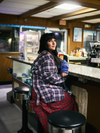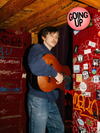Jubilee on Showing Three Generations of New Yorkers How to Dance
Wisdom from one of the city’s most trusted club stalwarts.

In New York City’s underground club scene, time moves at warp speed. The spots that once hosted the best night of your life turn into children’s climbing gyms or boutiques selling dainty, overpriced jewelry seemingly overnight. That warehouse where you attended a rave you’ll never forget is now a condo with apartments you could never afford.
Jubilee, who’s stewarded the NYC underground with her impeccably wubby taste for bass, electro, dancehall, rap, techno, and more, has kept pace with the city’s blinding momentum for 20 years. Whenever something’s popping, she’s there, either in the booth or on the dancefloor. In the last decade, she has run the crucial party Magic City—named in honor of her native Miami—which evolved into her own robust label with a roster of adventurous electronic music that challenges the confines of bass, breaks, electro, and more. The idea for the party and label was an outgrowth of Jubilee’s time working with legendary dancehall producer Dre Skull and his label, Mixpak. “Magic City started as this compilation on SoundCloud with Opening Ceremony,” she recently recalled, referring to the now-defunct SoHo boutique. “I would play fashion parties—which would never happen now, because I’m not an influencer. But there was a period of time where, like, Beyoncé was showing up to loft parties—New York was really kind of crazy, those few years.”
In the early 2010s, Jubilee played weird little dance parties for rave heads in concrete boxes with questionable fire-safety plans when she wasn’t taking part in huge sound-system battles in now-defunct midtown mega-clubs that were sponsored by Red Bull (back when corporations liked to fund the arts). She weathered the rise of EDM mostly intact, and experienced the industry’s temperamental attitude toward booking women DJs at festivals at parties: From practically no women to a smattering of women to fewer women once again. She watched the weird little dance nights morph into private parties held by crypto weirdos in Tribeca lofts. Through it all, though, her love of the rave remains constant.
Get access to everything we do at Hearing Things—including weekly album and song recommendations along with our ever-growing archive of interviews and reports—with a free 30-day trial!






